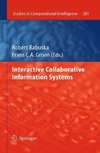The increasing complexity of our world demands new perspectives on the role of technology in human decision making. We need new technology to cope with the increasingly complex and information-rich nature of our modern society. This is particularly true for critical environments such as crisis management and traffic management, where humans need to engage in close collaborations with artificial systems to observe and understand the situation and respond in a sensible way. The book Interactive Collaborative Information Systems addresses techniques that support humans in situations in which complex information handling is required and that facilitate distributed decision-making. The theme integrates research from information technology, artificial intelligence and human sciences to obtain a multidisciplinary foundation from which innovative actor-agent systems for critical environments can emerge. It emphasizes the importance of building actor-agent communities: close collaborations between human and artificial actors that highlight their complementary capabilities in situations where task distribution is flexible and adaptive. This book focuses on the employment of innovative agent technology, advanced machine learning techniques, and cognition-based interface technology for the use in collaborative decision support systems.
 |
|
О проекте
|
|
О проекте


